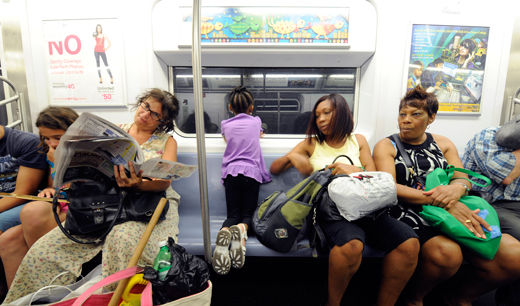
The Occupy Wall Street movement and the Amalgamated Transit Union have jointly declared April 4 a National Day of Action for Jobs and Mass Transit and are staging demonstrations that day in 20 cities across the country.
They said their joint mobilization is in keeping with Dr. Martin Luther King Jr.’s campaigns for good paying jobs and for accessibility of those jobs to the poor. The action comes as unions and civil rights organizations in general turn more of their attention to creation of jobs that can be accessed by people in communities hardest hit by the economic crash – communities of color and areas in the nation’s inner cities.
The ATU and Occupy Wall Street plan their joint demonstrations in 20 cities, including Chicago, New York and Pittsburgh.
The joint Occupy-labor operation and the linking of it to a 1967 speech by Dr. King, in which he denounced the Vietnam War and said resources spent there should be put into the fight against poverty, was first proposed by leaders of the Occupy Boston movement.
ATU President Larry Hanley said his union went for the idea with a great deal of enthusiasm. Hanley said the April 4 Day of Action “is intended to draw a straight line between Dr. King’s speech then and conditions afflicting the poor and middle class today. We’re going to focus on the impact of mass transit budget and service cuts on the poor and working Americans.”
The economic crash has resulted in sharp erosion of the tax base in the nation’s major cities. Workers who were paying the bulk of taxes that municipalities need to operate mass transit ceased doing this, of course, as more and more of them lost their jobs. Cities all over the country, then, were forced to slash mass transit.
“Chicago has lost 14 percent of its mass transit services in the last two years and Pittsburgh has lost more than 50 percent after the last three rounds of cuts,” Hanley said.
Hanley also noted that in New York mass transit services that have been available “for a hundred years” have fallen victim to the cuts.
The union hopes, he said, to use the April 4 events to reach out far beyond the ranks of union members. And even beyond the ranks of workers. “We want to reach everyone who rides on mass transit,” Hanley said, “and get the attention of the politicians who can reverse these cuts. The riders also happen to be the voters.”
Hanley said, in addition, that the demonstrations reflect the determination of the union to “reshape the entire dialogue about mass transit in the United States.”
The union believes, he said, that mobilization of mass transit riders is key to the protection and expansion of mass transit services.
In the announcement of the April 4 Day of Action Hanley said, “Dr. King called urban transportation a true genuine civil right” and “that still rings true today as our nation faces a public transportation crisis.”
Hanley and other labor leaders feel there is much that people still need to understand about the mass transit crisis.
People do understand that the eroding tax base forces transit agencies to slash services and raise fares. Fewer understand, however, that major financial institutions, the banks first and foremost, have been able to use the dilemma faced by the cities to rake in huge profits.
Hanley notes that even after making the cuts and raising the fares transit agencies, to keep buses and subways rolling, borrow millions of dollars from the banks, the people Occupy Wall Street describes as the “1 percent.” The banks then have turned destruction of mass transit into a profitable business for themselves.
“Their greed and corruption destroyed our economy and the middle class,” said Hanley and “now they’re undermining the transit systems it took a hundred years to build.”
Photo: New York City subway riders on a train from the borough of Brooklyn into Manhattan. Henny Ray Abrams/AP
Additional information:
In many cities the April 4 action will involve leafleting of riders as they enter and leave mass transit depots.
Occupy Chicago and the transit union are urging riders not to let their commute get “thrown under the bus” and will demonstrate at Chicago Transit Authority Headquarters at 567 W. Lake St. at 6 p.m.
In Seattle, the Occupy movement, together with the Seattle Transit Riders Union and other groups begin action at 11 a.m. near Safeco Stadium. Plans are to occupy buses and trains and travel to a downtown rally.
In Portland, Oregon, demonstrators will gather at 4 p.m. at Pioneer Courthouse Sq. on the city’s southwest side.
Check Occupy Wall Street and ATU websites for information about actions in other cities across the country.












Comments